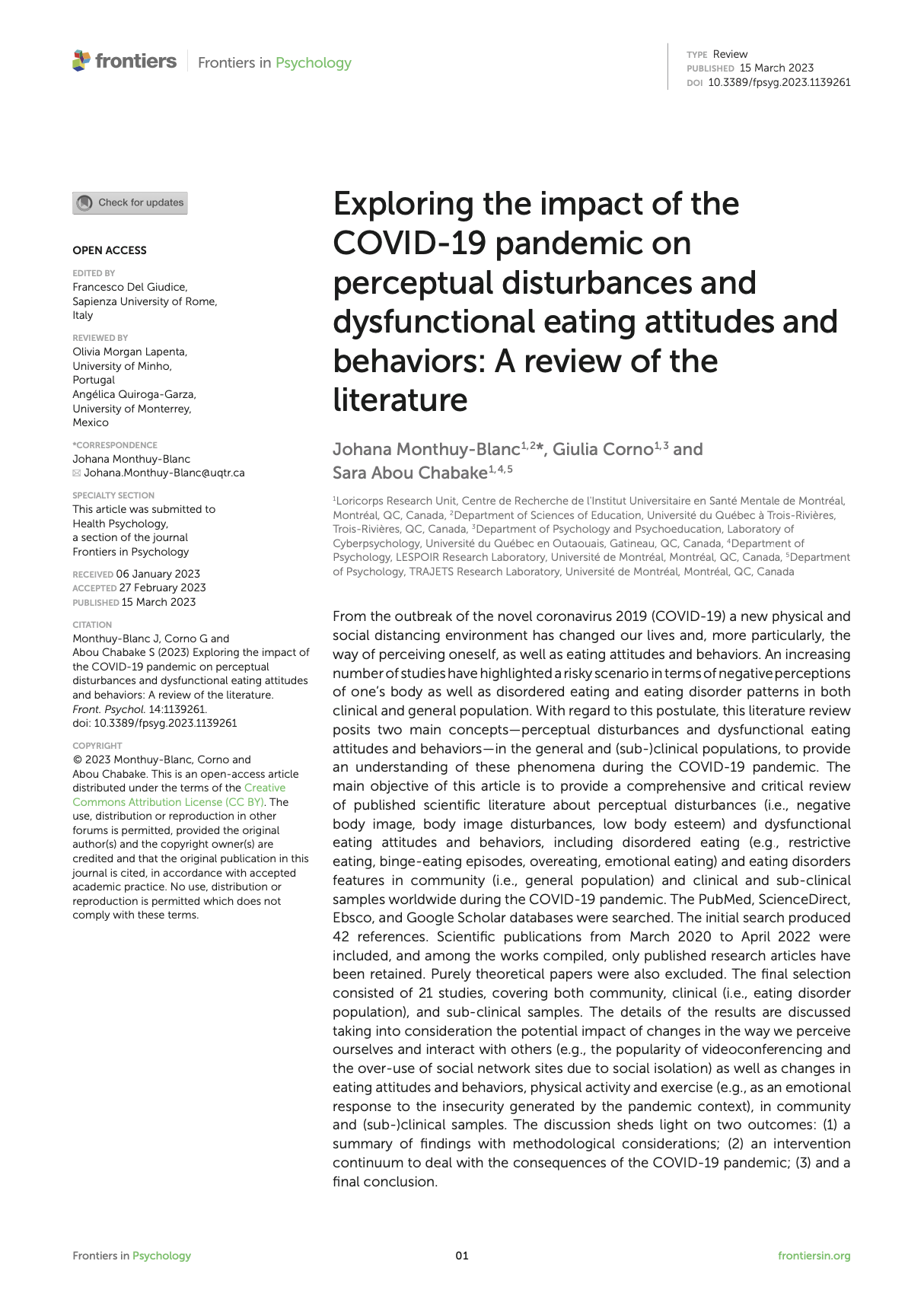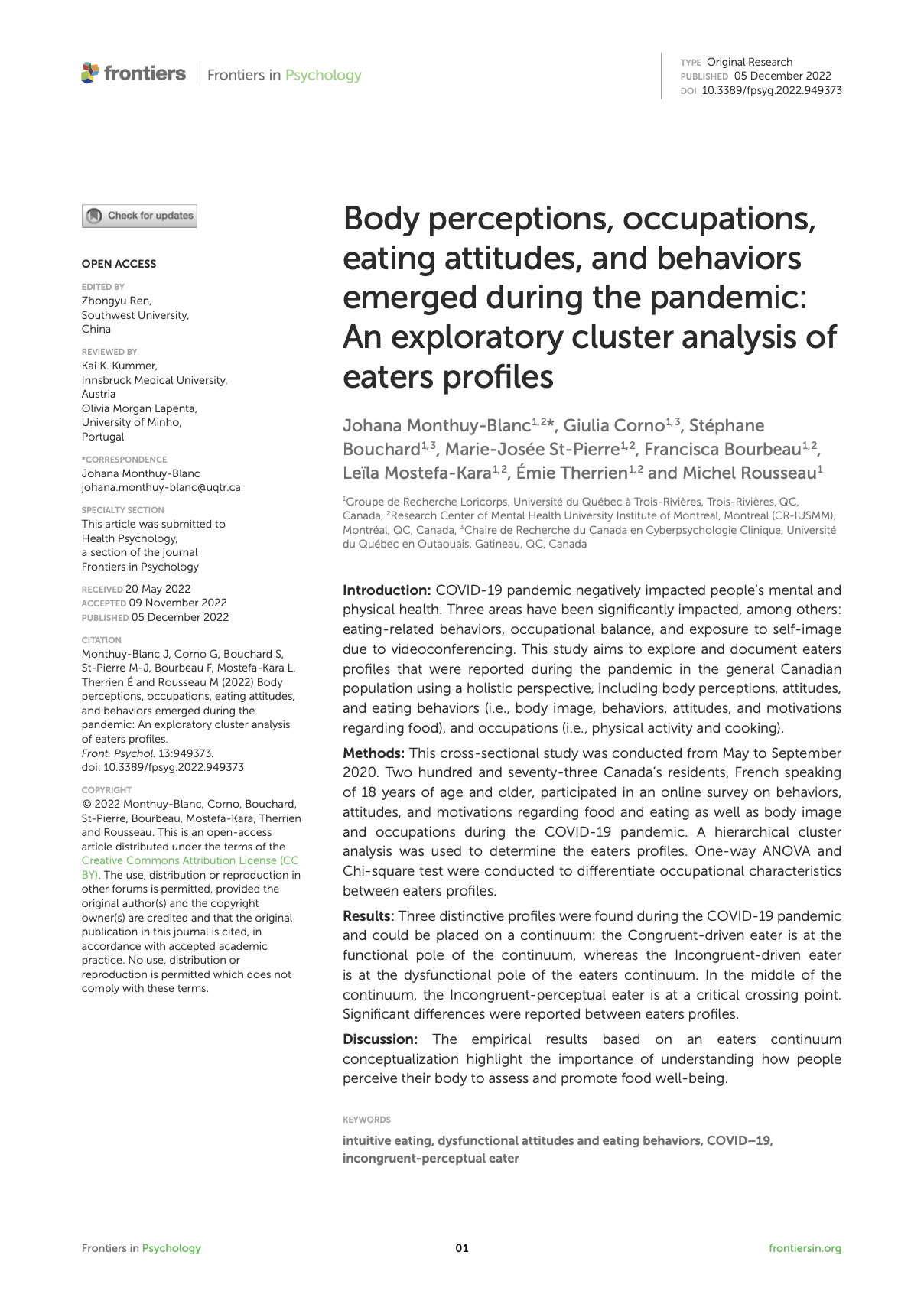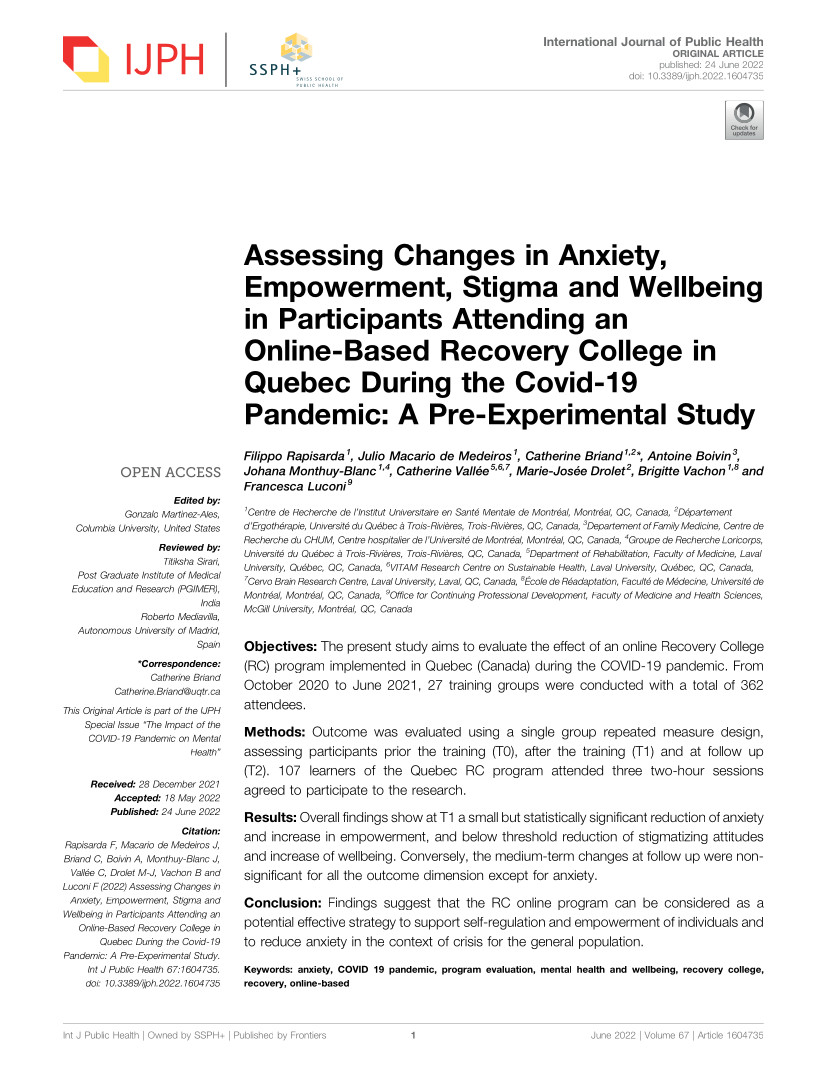SCIENTIFIQUE
La diffusion scientifique concerne davantage un public initié conceptuellement et empiriquement – le Savoir théorique – par le message (chercheurs, gestionnaire-chercheur, etc.) soumis le plus souvent à un comité de pairs et de portée internationale
Pour accéder à la revue de presse depuis 2018 :
PubMed Loricorps
Publications avec comité de lecture :
Note : * L'astérisque spécifie qu'il s'agit de l'étudiant.e de l'auteure
 Eating disorders: When food "Eats" time
Eating disorders: When food "Eats" time
The presence of a physical or mental health issue, such as an eating disorder (ED), impacts daily activities, also known as occupations. For example, an overinvestment in body shape and weight undoubtedly can lead to an underinvestment in other, more meaningful occupations. To address ED-related perceptual disturbances, a detailed log of daily time use can pinpoint food-related occupational imbalances. This study aims to characterize the daily occupations associated with EDs. The first specific objective (SO.1) is to categorize and quantify the temporal organization of a typical day’s occupations as self-reported by individuals with an ED. The second specific objective (SO.2) is to compare daily occupational time use among people with different ED types. This retrospective study based on time-use research principles was conducted by analyzing data from an anonymized secondary dataset (Loricorps’s Databank). Data were collected between 2016 and 2020, from 106 participants, with descriptive analysis completed to determine the average daily time use for each occupation. A series of one- way analyses of variance (ANOVAs) were performed to compare perceived time use in each occupation for participants with different types of EDs. The outcomes show a marked underinvestment in leisure categories compared to the general population. In addition, personal care and productivity can represent the blind dysfunctional occupations (SO.1). Moreover, compared to those with binge eating disorder (BED), individuals with anorexia nervosa (AN) are significantly more invested in occupations that focus explicitly on perceptual disturbances, such as personal care (SO.2). The highlight of this study is the distinction between marked versus blind dysfunctional occupation, which offers specific avenues for clinical intervention.
St-Pierre, M.-J.*, Therriault, P.-Y., Faghihi, U., & Monthuy-Blanc, J. (2023). Eating Disorders: When Food “Eats” Time. Appetite, 106509 https://doi.org/10.1016/j.appet.2023.106509

Exploring the impact of the COVID-19 pandemic on perceptual disturbances and dysfunctional eating attitudes and behaviors: A review of the literature
From the outbreak of the novel coronavirus 2019 (COVID-19) a new physical and social distancing environment has changed our lives and, more particularly, the way of perceiving oneself, as well as eating attitudes and behaviors. An increasing number of studies have highlighted a risky scenario in terms of negative perceptions of one’s body as well as disordered eating and eating disorder patterns in both clinical and general population. With regard to this postulate, this literature review posits two main concepts—perceptual disturbances and dysfunctional eating attitudes and behaviors—in the general and (sub-)clinical populations, to provide an understanding of these phenomena during the COVID-19 pandemic. The main objective of this article is to provide a comprehensive and critical review of published scientific literature about perceptual disturbances (i.e., negative body image, body image disturbances, low body esteem) and dysfunctional eating attitudes and behaviors, including disordered eating (e.g., restrictive eating, binge-eating episodes, overeating, emotional eating) and eating disorders features in community (i.e., general population) and clinical and sub-clinical samples worldwide during the COVID-19 pandemic. The PubMed, ScienceDirect, Ebsco, and Google Scholar databases were searched. The initial search produced 42 references. Scientific publications from March 2020 to April 2022 were included, and among the works compiled, only published research articles have been retained. Purely theoretical papers were also excluded. The final selection consisted of 21 studies, covering both community, clinical (i.e., eating disorder population), and sub-clinical samples. The details of the results are discussed taking into consideration the potential impact of changes in the way we perceive ourselves and interact with others (e.g., the popularity of videoconferencing and the over-use of social network sites due to social isolation) as well as changes in eating attitudes and behaviors, physical activity and exercise (e.g., as an emotional response to the insecurity generated by the pandemic context), in community and (sub-)clinical samples. The discussion sheds light on two outcomes: (1) a summary of findings with methodological considerations; (2) an intervention continuum to deal with the consequences of the COVID-19 pandemic; (3) and a final conclusion.
Monthuy-Blanc,J; Corno, G*; Abou Chabake, S*. (2023). Exploring the impact of the COVID-19 pandemic on perceptual disturbances and dysfunctional eating attitudes and behaviors: A review of the literature. Frontiers in nutrition. 14: 113926. https://doi.org/10.3389/fpsyg.2023.1139261
 Initial evidence of the effectiveness of a short, online Recovery College Model: a co-learning model to support mental health in the context of the Covid-19 pandemic
Initial evidence of the effectiveness of a short, online Recovery College Model: a co-learning model to support mental health in the context of the Covid-19 pandemic
Introduction. The Covid-19 pandemic (C-19) has a negative impact on the mental health of the general population and in particular, women, people with chronic physical illness or psychiatric conditions, students and health care providers. Targeting these needs, the Recovery College (RC) model offers a new and innovative approach based on co-learning and learner diversity. The model provides a co-learning space where at-risk populations and the general public learn together and collectively equip themselves to better address psychological well-being and mental health issues. Objective. The objective is to present the initial results of the RC co-learning model in a short online format to meet the pressing needs of mental health intervention in the C-19 context. Method. A pre-post research design with repeated measures was used. Results. Results suggest improved knowledge and use of tools to support mental health interventions, self-management strategies, anti-stigma attitudes, and protection against increased anxiety. Conclusion. This RC model allows people from all backgrounds to participate in an innovative co-learning model in which experiential knowledge is central to learning to stimulate reflection and change in attitudes and behaviors.
Briand, C; Medeiros, J; Vallée, C; Luconi, F; Vachon, B; Monthuy-Blanc, J; Drolet, MJ; Montminy, S. (2023). Initial evidence of the effectiveness of a short,online Recovery College Model: a co-learning model to support mental health inthe context of the Covid-19 pandemic. Journal of Recovery in Mental Health. 6(1): 29-37. https://doi.org/10.33137/jrmh.v6i1.38706

Body perceptions, occupations, eating attitudes, and behaviors emerged during the pandemic: An exploratory cluster analysis of eaters profiles
Introduction: COVID-19 pandemic negatively impacted people’s mental and physical health. Three areas have been significantly impacted, among others: eating-related behaviors, occupational balance, and exposure to self-image due to videoconferencing. This study aims to explore and document eaters profiles that were reported during the pandemic in the general Canadian population using a holistic perspective, including body perceptions, attitudes, and eating behaviors (i.e., body image, behaviors, attitudes, and motivations regarding food), and occupations (i.e., physical activity and cooking).
Methods: This cross-sectional study was conducted from May to September 2020. Two hundred and seventy-three Canada’s residents, French speaking of 18 years of age and older, participated in an online survey on behaviors, attitudes, and motivations regarding food and eating as well as body image and occupations during the COVID-19 pandemic. A hierarchical cluster analysis was used to determine the eaters profiles. One-way ANOVA and Chi-square test were conducted to differentiate occupational characteristics between eaters profiles.
Results: Three distinctive profiles were found during the COVID-19 pandemic and could be placed on a continuum: the Congruent-driven eater is at the functional pole of the continuum, whereas the Incongruent-driven eater is at the dysfunctional pole of the eaters continuum. In the middle of the continuum, the Incongruent-perceptual eater is at a critical crossing point. Significant differences were reported between eaters profiles.
Discussion: The empirical results based on an eaters continuum conceptualization highlight the importance of understanding how people perceive their body to assess and promote food well-being.
Monthuy-Blanc, J; Corno, G*; St-Pierre, M-J*; Bouchard, S; Bourbeau, F.*; Mostefa-Kara, L.*; Therrien, E; Rousseau, M. (2022). Body perceptions, occupations, eating attitudes,and behaviors emerged during the pandemic: An exploratory cluster analysis of eaters profiles. Frontiers in psychology. 13: 949373. https://doi.org/10.3389/fpsyg.2022.949373

Assessing Changes in Anxiety, Empowerment, Stigma and Wellbeing in Participants Attending an Online-Based Recovery College in Quebec During the Covid-19 Pandemic: A Pre-Experimental Study
Objectives: The present study aims to evaluate the effect of an online Recovery College (RC) program implemented in Quebec (Canada) during the COVID-19 pandemic. From October 2020 to June 2021, 27 training groups were conducted with a total of 362 attendees.
Methods: Outcome was evaluated using a single group repeated measure design, assessing participants prior the training (T0), after the training (T1) and at follow up (T2). 107 learners of the Quebec RC program attended three two-hour sessions agreed to participate to the research.
Results: Overall findings show at T1 a small but statistically significant reduction of anxiety and increase in empowerment, and below threshold reduction of stigmatizing attitudes and increase of wellbeing. Conversely, the medium-term changes at follow up were nonsignificant for all the outcome dimension except for anxiety.
Conclusion: Findings suggest that the RC online program can be considered as a potential effective strategy to support self-regulation and empowerment of individuals and to reduce anxiety in the context of crisis for the general population.
Rapisarda, F., Macario de Medeiros, J., Briand, C., Boivin, A., Monthuy-Blanc, J., Vallée, C., Drolet, MJ., Vachon, B., & Luconi, F. (2022). Assessing changes in anxiety empowerment stigma and wellbeing in participants attending an Online-Based Recovery College in Quebec during the Covid-19 pandemic: a pre-experimental study. International Journal of Public Health, 67. https://doi.org/10.3389/ijph.2022.1604735
Ouvrages :
- Monthuy-Blanc J. St-Pierre, M-J.*, Ménard, J., & St-Pierre, L. (en préparation). Programme eLoriCorps. Intervenir en attitudes et comportements alimentaires dysfonctionnels par la e-Santé pour un mieux-être corporel et alimentaire selon l’approche transdisciplinaire ePros-A
- Monthuy-Blanc J. et Harnois, J. et collaborateurs Santé, boire et manger intuitivement (contrat signé chez JFD Éditions).
- Monthuy-Blanc, J., Bonanséa, M., Bouchard, S., Côté, M.E., Dupont, A., Julien, A., Grazia Martinoli, M., Ouellet, M., Pauzé, R., St-Pierre, M.J., St-Pierre, L. & Thibault, I. (2018). Fondements approfondis des troubles du comportement alimentaire. JF éditions : QC.
- Monthuy-Blanc, J. & Ouellet, M. (2016). Symposium international en Mauricie / Centre du Québec « Intervenir en troubles du comportement alimentaire : des données probantes à l'efficacité clinique » : Livret post symposium. Article publié, Loricorps.
- Monthuy-Blanc, J., Blanc, E. & Wany, S. (2015). Korkifaipo (Bande-dessinée pédagogique). Article publié, Trip.
Chapitres de livres :
- Larouche, M-C., Monthuy-Blanc, J., Point, M., Touré, F., Samson, J., Lemieux, V.*, Akpedje, T. et Senneville, G. (sous presse). Portrait initial des futurs médiateurs culturels en formation à l’éducation préscolaire et l’enseignement primaire à l’UQTR. Dans G. Sirois et G. Bellavance (dir.), Les arts à l’université : institutionnalisation et pluralisation de l’action culturelle (vol.71). Cahiers de recherche sociologique.
- Monthuy-Blanc, J., Moreau, N., St-Pierre, M-J., Ouellet, M., Poulin, C., Lemieux, V.*, & Mostefa‐Kara, L.*, (2022). Le sport : se percevoir et s’accepter. Dans S., Arcand et J., Bilodeau (dir.), Au-delà du sport, étude de cas en gestion sportive (pp.245-256). JFD éditions.
- Ouellet, M.*, Monthuy-Blanc, J., & Moreau, N. (2022). Bouger : synonyme ou absence de santé ? Dans S., Arcand et J., Bilodeau (dir.), Au-delà du sport, étude de cas en gestion sportive (pp.205-215). JFD éditions.
- St-Pierre, L., Monthuy-Blanc, J., St-Pierre, M.J.*, & Ouellet, M.* (2022). Le patient-partenaire comme membre à part entière de l’équipe de soins : exemplification via le programme eLoriCorps. Dans P., Lartiguet, D., Broussal, M., Saint-Jean, et N., Szapiro (dir.), Ouvrage collectif Le Partenariat en santé, Savoirs croisés entre patients, proches aidants, professionnels et chercheurs (p. 192). Seli Arslan
- Larouche, M-C., Monthuy-Blanc, J. Point, M, Touré, F, Fillion, P.-L., Lemieux, V.*, Akpedje, T. (2022). Être médiateurs culturels à l’UQTR : apprendre à apprécier et à intégrer des ressources culturelles à l’éducation préscolaire et à l’enseignement primaire. Dans A. Araújo-Oliveira et É. Tremblay-Wragg (dir.), Des pratiques inspirantes au cœur de la formation à l’enseignement (179-200). Presses de l’Université du Québec.
Publications sans comité de lecture :
- Bonanséa, M., Rojo, S., & Monthuy-Blanc, J. (2016). Périodes de transitions académiques, développementales et sportives chez l’élève-sportif : répercussions de la recherche de performance sur les attitudes et les désordres alimentaires. Bulletin Images ANEB.: 8-9.
-
Bonanséa, M., & Monthuy-Blanc, J. (2016). Prévenir les TCA…oui mais comment ? Bulletin images ANEB, 2-4.
-
Bonanséa, M., Julien, A., Monthuy-Blanc, J., & Gagnon-Girouard, M.P. (2016). Les bonnes pratiques pour une prévention primaire des TCA efficace, Bulletin Images ANEB, 5-7.
-
Bonanséa, M., Rojo, S., & Monthuy-Blanc, J. (2016). Périodes de transitions académiques, développementales et sportives chez l’élève-sportif : répercussions de la recherche de performance sur les attitudes et les désordres alimentaires, Bulletin Images ANEB, 8-9.
-
Bonanséa, M., Julien, A., Gagnon-Girouard, M.P., & Monthuy-Blanc, J. (2016), Une amie, Bulletin Images ANEB, 10-11.
